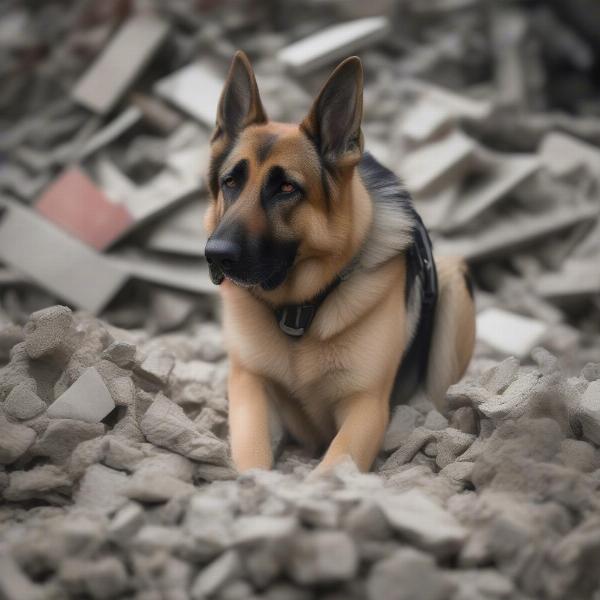City morgue dogs, also known as cadaver dogs or human remains detection dogs, play a crucial role in forensic investigations. These highly trained canines possess an extraordinary sense of smell, enabling them to locate deceased individuals in a variety of challenging environments, from urban landscapes to natural disaster sites. Understanding their training, capabilities, and the ethical considerations surrounding their work is vital for appreciating their contribution to forensic science and bringing closure to grieving families.
 City Morgue Dog Searching Rubble
City Morgue Dog Searching Rubble
These remarkable dogs are trained to detect the unique scent of human decomposition, a complex cocktail of volatile organic compounds (VOCs). This specialized training allows them to differentiate between human remains and animal carcasses, a critical distinction in forensic investigations. Their ability to pinpoint the location of a body, even when buried deep underground or submerged in water, is invaluable to law enforcement. They can also assist in locating scattered remains in challenging terrains, significantly aiding in the recovery process.
The Training and Skills of City Morgue Dogs
Training a city morgue dog is a rigorous and time-consuming process that requires patience, dedication, and specialized expertise. From a young age, these dogs are introduced to the scent of human remains through carefully controlled exercises. This involves using training aids that mimic the scent of decomposition at various stages. The dogs are rewarded for correctly identifying the target scent, reinforcing the desired behavior.
Specialized Search Techniques
City morgue dogs utilize various search techniques depending on the environment and the specific circumstances of the case. These may include area searches, where the dog systematically covers a large area, or trailing, where the dog follows a specific scent trail. They can also be trained to work in confined spaces, such as buildings or vehicles, and even in water, using specialized boats or diving equipment.
Ethical Considerations in Utilizing City Morgue Dogs
While the benefits of using city morgue dogs are undeniable, ethical considerations must also be addressed. The well-being of the dog is paramount. Handlers must ensure the dogs are not overworked or exposed to hazardous environments that could compromise their health. Furthermore, the sensitive nature of their work necessitates careful handling of the information they provide, respecting the dignity of the deceased and the privacy of their families.
How City Morgue Dogs Bring Closure
For families grappling with the loss of a loved one, the work of city morgue dogs can be instrumental in providing closure. Locating the remains of a missing person allows families to begin the grieving process and to lay their loved one to rest. This can bring a sense of peace and resolution that would otherwise be impossible.
Conclusion
City morgue dogs are invaluable assets in forensic investigations, providing critical assistance in locating deceased individuals and bringing closure to grieving families. Their specialized training, exceptional sense of smell, and unwavering dedication make them indispensable partners in the pursuit of justice and healing.
FAQ
-
How long does it take to train a city morgue dog? Training can take anywhere from several months to a couple of years, depending on the dog’s aptitude and the specific requirements of the job.
-
What breeds are typically used as city morgue dogs? Breeds commonly used include German Shepherds, Labrador Retrievers, and Belgian Malinois, known for their intelligence, trainability, and strong sense of smell.
-
Are city morgue dogs exposed to dangerous environments? Handlers prioritize the dog’s safety and avoid exposing them to unnecessarily hazardous conditions.
-
How do city morgue dogs differentiate between human and animal remains? They are specifically trained to recognize the unique scent of human decomposition.
-
What is the role of the handler in a city morgue dog team? The handler is responsible for the dog’s training, well-being, and directing the dog during searches.
ILM Dog is a leading international website dedicated to providing expert advice and resources on all aspects of dog care and well-being. We cover a wide range of topics, from breed selection and training to health, nutrition, and grooming. Whether you’re a seasoned dog owner or just starting your journey, ILM Dog is here to support you every step of the way. Contact us at [email protected] or +44 20-3965-8624. We’re dedicated to helping you give your furry friend the best life possible!